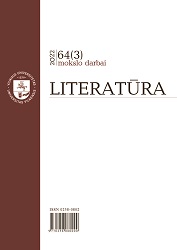The Antinomy of Philology (an Approach by Jules David)
The Antinomy of Philology (an Approach by Jules David)
Author(s): Fatima EloevaSubject(s): Ancient World, Historical Linguistics, Comparative Linguistics, 18th Century, 19th Century, Philology
Published by: Vilniaus Universiteto Leidykla
Keywords: Ancient Greek; Modern Greek; literary standard; diglossia; plurilingualism; the Age of Enlightment;
Summary/Abstract: The paper presents an attempt to reconstruct the original method of mastering the Modern Greek, created for classical philologists by a talented researcher and classical philologist Jules David. Jules David (Charles-Louis-Jules David, 1783–1854) was the son of Jacques-Louis David (1748–1825), apparently the most successful and well paid artist in the entire history of France, the creator of neoclassicism. We will try to show that his scientific conception presents an interesting attempt to establish a connection between the ancient and modern state of the Greek continuum. Jules David’s linguo-didactic approach is innovative and unexpected – while discussing the standard of the Greek language, he managed to combine elegantly the descriptive and prescriptive aspects of the language analysis. His main work, the Comparative description of the Ancient Greek and Demotic Languages (Συνοπτικός παραλληλισμός της ελληνικής και γραικικής απλοελληνικής γλώσσης) is a fascinating attempt to establish the parallels of the Ancient Greek and Modern Greek languages. In addition Jules David set himself another and not trivial task indeed – to make classical philologists, dealing with the Ancient Greek, feel that they are dealing with a living language, and not with a dead scheme. We believe that this strategy of David, due to its originality, has not been fully understood by researchers and can be compared with the views of another outstanding neo-Hellenist and philosopher Nikolaj Bakhtin, the brother of philosopher Mikhail Bakhtin (1884–1950).
Journal: Literatūra
- Issue Year: 64/2022
- Issue No: 3
- Page Range: 66-76
- Page Count: 11
- Language: English

